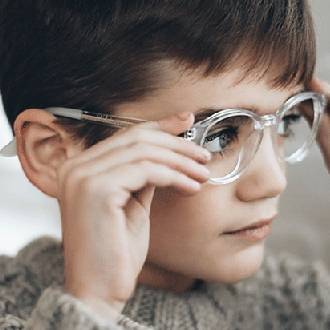
Common misconceptions around children's vision
Posted on
Myth 1
"Glasses might make my child's vision worse or give them a lazy eye"
The Association of Optometrists advice:
"Wearing glasses does not make your eyes ‘weak,’ or ‘dependent’ on glasses. In most cases, glasses will actually help to relieve strain on the eyes and to relax the eye muscles.
Wearing glasses as prescribed can help our sight to develop normally and achieve its full potential. Recent evidence has shown that under correction of certain types of prescription can in fact accelerate a deterioration.
You should always encourage your child to wear their glasses as instructed by your optometrist."
Myth 2
"I don't need to arrange a sight test for my child because their school/nursery will take care of it"
The Association of Optometrists advice:
"Some children do receive vision screening in school - this is usually done around the age of five. The primary aim is to find those children with reduced vision or binocular vision problems, so they can be referred to a local optometrist or hospital eye service for further investigation, and treatment if necessary.
Unfortunately, the reality is that provision of these services is very patchy in the UK, and in many areas children receive no vision screening at all.
A sight test is a much more comprehensive check than vision screening, because it includes a check to see whether glasses or contact lenses are necessary, and an examination of ocular health. Everyone should have a sight test every two years, or more often if your optometrist recommends it, and all children are entitled to NHS-funded sight tests up to the age of 16."
Myth 3
"My husband and I don't wear glasses, so my child will not need them either"
The Association of Optometrists advice:
"The need to wear glasses can be influenced by both genetic and environmental factors.
The nature of genetics is complex and there are many genes that have been identified as being associated with visual problems.
Family history, ethnic background, environment (living indoors, in cities) and carrying out near tasks, such as screen use, have all been linked to the development of short-sightedness.

Myth 4
"I need to wait until my child can read before they can have their sight tested"
The Association of Optometrists advice:
"Children don’t need to be able to read words, or even letters, in order to be able to have a sight test. Optometrists can use other methods, such as pictures, to check how well your child can see.
As part of a sight test, optometrists also check that a child’s eyes are healthy, and whether they need spectacles or contact lenses to help them see.
Many eye problems can be treated more effectively if picked up early, so we recommend that all children visit their optometrist for a sight test around the age of three."
As such, it is difficult to pinpoint an exact cause or reason that a child might need to wear glasses, even if the parents do not."
Quick links
Contact info
4-6 Queen St, Magherafelt, BT45 6AB.
Mon - Fri, 9am - 5pm
Tues to 7pm by appointment only.



